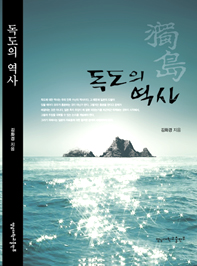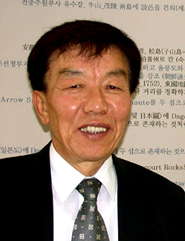\"Sovereignty of Dokdo Island, a Historic Issue\" N
No.88405- Writer YU
- Date : 2011.05.12 09:54
- Views : 11570
Professor Kim, Wha-kyong\'s Book Proves sovereignty over Dokdo Island from a Historic View
Japanese claim based on myth
[April 4, 2011]
Recently, Japan\'s ministry of education, culture, sports, science and technology presented the results of verifying the textbooks for middle school sociology and announced its policies to \"Teach that Dokdo Island is the territory of Japan by both history and international law, and that Korea is illegally occupying it,\" and thus Korea-Japan foreign relations are once again being strained.


At such point, YU\'s Professor Kim, Wha-kyong (64, Department of Korean Language and Literature) published the <History of Dokdo> (YU University Press, p. 397), clarifying the reason why Japan\'s claim is false and its problems.
The author, who is also the director of the YU Dokdo Institute, begins his argument under the premise that Dokdo Island is a historic issue, and not one of international law. This is to make sure that Korea does not fall for Japan\'s plans to make Dokdo Island a regional of territorial dispute according to international law so that it can take the case to the International Court of Justice.
Kim criticized, \"Japan is intending to make Dokdo Island an area of international territorial dispute so that Japan can make it into an issue of international law. However, behind this there is a conspiracy to ignore historic facts.\"
The author suggests that based on the fact that Dokdo Island was located at a visible distance from Ulleungdo Island, it was a living space of people of Usanguk (Ulleungdo). This presumption is based on the customs of ancient civilizations without clear-cut concepts of borders that \'living space is as far as the land visible\', and such perception of space was found in Saito\'s book, proving that this was a common perception of the two countries. He also stated that during the course of establishing the name of Dokdo as Usando, there was a clear perception that it was a territory of Korea when composing the map in the <Sejong Chronicles>.
Additionally in the process of resolving the \'Ulleungdo Issue\' (Korea-Japan conflict on the fishing rights and territorial rights when Park, Eo-dun and Ahn, Yong-bok were kidnapped by fishers of the Murakami family in 1693), he reveals that the Japanese feudal government perceived Ulleungdo (Jukdo) and Dokdo (Songdo) as one set. The Japanese feudal government at the time recognized Ulleungdo as Korean territory and forbid the crossing of sea to Jukdo (Ulleungdo), and its basis was the \'distance\' to Ulleungdo from Korea and Japan. In other words, this was because \"Ulleungdo was near Korea and very far from Hoki of Japan.\" Thus, this proves that Dokdo, which is close to Ulleungdo, was recognized as the territory of Korea.
The author states that such territorial recognition of Dokdo was completed by the time of King Sukjong\'s reign. Based on the records in the <Sukjong Chronicles> in the 40th year of Sukjong (1714), it states that \"There is an island visible on the east side of Ulleungdo and it is near the border with Japan,\" which shows the Dokdo was declared as Korea\'s territory since the reign of King Sukjong.
The author proved that the \'Preoccupancy of unclaimed land\', \'inherent territory theory\' and the 17th century cognitive theory\' that are the bases of Japan\'s territorial claims were not based on facts, but merely a lie made to take Dokdo, with concrete evidence. One example is that Inherent territory of the empire in the \'inherent territory theory\' that Japan uses to claim that Dokdo is their inherent land, are Honshu, Kyushu, Shikoku, and Awajido just as legend has, appearing in <Imperial Territory> discovered by Yamabe Kentaro in Ito Miyoji\'s a document. The author revealed this lack of logic claimed by Japan saying, \"Japan is the only country in the 21st century that claims inherent land based on legend.\"
Through many studies and observations, the author shows that Usando was not perceived as a territory of Korea overnight, but was recognized since the 15th century. In chapter 8, after examining the critical mind on \"How did Japan view Dokdo before trying to take Dokdo\', the author revealed that in 1869, the Sata Hakubo envoy submitted a document called \'Facts Exchange with Joseon\' with clear instructions to \'investigate the facts on how Jukdo and Songdo became part of Joseon\', which in turn reveals that the Meiji government also recognized that Jukdo (Ulleungdo) and Songdo (Dokdo) as Korea\'s territory.
Kim stated that \"During my research, it was repeatedly found that Dokdo was historically the territory of Korea,\" and criticized, \"Japan trying to claim that Dokdo is theirs with fraudulent logic is like trying to cover the sun with their hands and saying that the sun does not exist.\" He also emphasized, \"I repeat, Dokdo is a historic issue and not one of international law. Thus, our sovereignty over Dokdo must be defined from a historic perspective. There is absolutely no reason to try to solve it through international law.\"
Meanwhile, Professor Kim presented Lee, Ju-ho, Minister of Education, Science and Technology, who attended the opening ceremony of \'Meeting Dokdo\' at the Cheonan Independence Hall of Korea on the 4th, with his book \'History of Dokdo\', and once again emphasized the importance of education on the history of Dokdo.